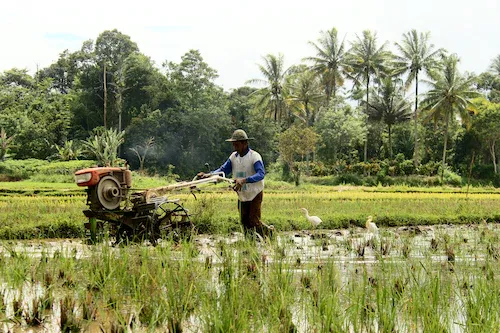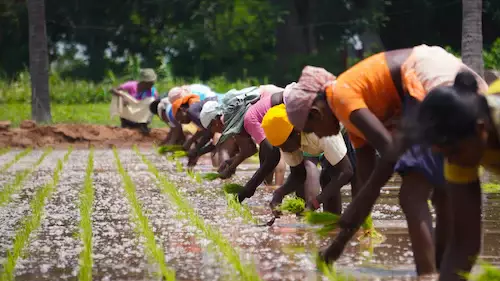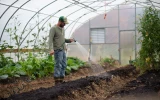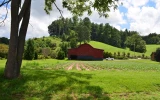The Difference Between a Small Farm and A Hobby Farm
Small farms can provide a diverse source of food for local communities. A hobby farm is owned and operated for the purpose of hobby pursuits. We'll be looking at the various characteristics of each type of farm, the motivations behind each, and the advantages and disadvantages of each.
A small farm is generally used to produce food and other products for sale, while a hobby farm is generally used for personal enjoyment and recreation. A small farm's primary focus is on producing a profit, while a hobby farm may have a few animals or crops that are not necessarily used for profit.
Whether you're just starting in the farming world or considering your options, this guide will help you decide which type of farm is right for you. Let's explore the potential for success and what's involved in running each type of farm.
Summary
- A small farm is a business that produces food or other agricultural products for sale.
- A hobby farm is a small farm that is owned and operated for the sole purpose of pleasure, recreation, or self-satisfaction and is not intended to make a profit.
- Hobby farms are generally smaller than small farms and are used for personal enjoyment and recreation rather than commercial farming.

On this page:
Let's Differentiate A Small Farm and A Hobby Farm
A small farm and a hobby farm can be quite similar in many ways, but there are also some notable differences.
1. A small farm is usually larger than a hobby farm
A small farm typically ranges from 50 to 100 acres in size and is used for commercial farming. A hobby farm's size typically ranges from five to fifty acres. The size depends on the type of animals, crops, and other activities that are planned for the farm.
2. A small farm typically produces crops and livestock for commercial purposes, while a hobby farm is primarily for personal enjoyment
A small farm typically has a variety of crops, livestock, and equipment and may employ several workers. The farm may also include a barn, storage facilities, and other structures. Small farms may also have a variety of animals, such as horses, cows, pigs, chickens, and goats.
The farmer may also use specialized equipment, such as tractors, combines, and other machines, to help with the farm's operations. A small farm typically produces a variety of crops, including fruits, vegetables, grains, and hay. It may also produce livestock, such as cattle, sheep, and pigs, for sale or use on the farm.
Hobby farms often feature a variety of animals, such as chickens, goats, cows, pigs, horses, and other livestock. Crops such as hay, fruit, vegetables, and grains are also commonly grown on hobby farms. Many hobby farms also include a variety of other activities such as beekeeping, making cheese, producing maple syrup, and making wine.
3. A small farm requires more investment in land, equipment, and labor, while a hobby farm requires less
A small farm investment could include purchasing land, equipment, and labor.
- The land would include acreage, fencing, and outbuildings such as a barn or other structures.
- Equipment would include tractors, harvesters, and other specialized equipment for crop production or livestock.
- Labor would include hiring workers or contractors for various tasks such as planting, harvesting, and caring for livestock.
Additionally, the farm would likely require investments in seed, fertilizer, and other supplies necessary for successful crop production. Lastly, investments in technology, such as irrigation systems and climate control systems, would be necessary to ensure optimal yields.

Depending on the size and scope of the hobby farm, the investment can vary greatly.
-
Land: If the hobby farm is going to be located within a suburban or urban area, the investment in the land may require the purchase of an existing home or a smaller parcel of land to build on. If the hobby farm is located in a more rural area, the land may require more of an investment, such as multiple acres of land with pastures and agricultural land, or land that can be used for a variety of agricultural activities.
-
Equipment: Depending on the type of hobby farm and the activities planned, many types of equipment may need to be purchased. For example, if the hobby farm is going to be used for growing crops and tending animals, there may be a need for tractors, plows, harvesters, seeders, and other farming equipment. If the hobby farm is going to be used for raising animals, there may be a need for feeders, waterers, and other animal-related equipment.
-
Labor: Having seasonal workers for planting, harvesting, and other seasonal tasks. Hiring farmhands to help with daily chores such as animal care and crop maintenance
4. A small farm produces crops and livestock for commercial sale, while a hobby farm may produce food for personal consumption
A small farm typically produces a variety of crops, such as corn, soybeans, wheat, and vegetables. Livestock raised on the farm may include cows, chickens, pigs, and sheep. The farm may also have greenhouses and a variety of fruit trees and grape vines. Depending on the farm’s size, the farm may also have a dairy and/or egg production facility.
All of these products are sold commercially to stores, restaurants, and other customers. The farm may also have a small stand at a local farmers market where they can sell their products directly to customers.
A hobby farm may produce a variety of vegetables and fruits, such as tomatoes, potatoes, carrots, zucchini, apples, pears, and strawberries. Herbs like basil, oregano, rosemary, and chives can also be grown.
Livestock such as chickens, ducks, goats, and pigs can also be raised for eggs, meat, and milk. Bees can be kept for honey production. Finally, a variety of nuts, like almonds and walnuts, can be grown for personal consumption.
5. A small farm is subject to more stringent regulations than a hobby farm
A small farm must abide by all local zoning laws and regulations, be registered with the local department of agriculture, and have a valid license to operate. The farm must follow all applicable laws and regulations related to animal husbandry and food safety and must be inspected regularly to ensure compliance with these regulations.
On a hobby farm, all barns, sheds, and other outbuildings must meet local zoning and building regulations, and all animals must be monitored and treated for parasites or other health concerns.

6. A small farm may be eligible for certain tax benefits, while a hobby farm is not
A small farm that is eligible for certain tax benefits would need to meet certain criteria.
- The farm must be operated on a commercially viable basis and have a gross annual income of at least $1,000.
- The farm must be located in the United States and must not be part of a larger business.
- The farm must be registered with the IRS and have an Employer Identification Number (EIN).
- The farm must not be used primarily for personal or recreational purposes.
A hobby farm is not eligible for tax benefits such as deductions for business expenses, depreciation of farm equipment, or agricultural subsidies. Hobby farms also do not qualify for agricultural tax credits such as land preservation tax credits.
7. A small farm typically requires more expertise and experience than a hobby farm
The small farm implements advanced irrigation, fertilization, and pest control techniques. The farm has a small team of experienced and knowledgeable workers who can take care of the day-to-day operations. The farm has a full-time manager and a few part-time employees.
The farm must be able to maintain and repair its equipment, so knowledge of farm machinery and tools is essential. It must also be able to produce high-quality produce, livestock, and grains that are in demand. The farm must have a clear plan and strategy for marketing and selling its products and must be able to keep up with the latest technologies and trends in farming to remain competitive.
A hobby farm can start small with one or two animals, such as chickens, ducks, sheep, goats, pigs, and rabbits, and build basic enclosures, such as chicken coops, duck houses, and fencing for other animals.



